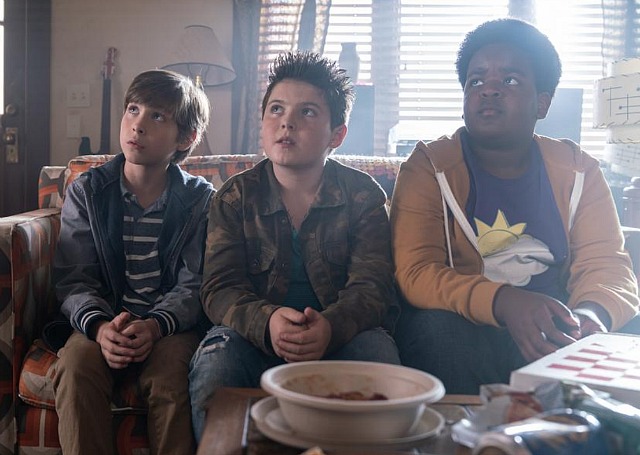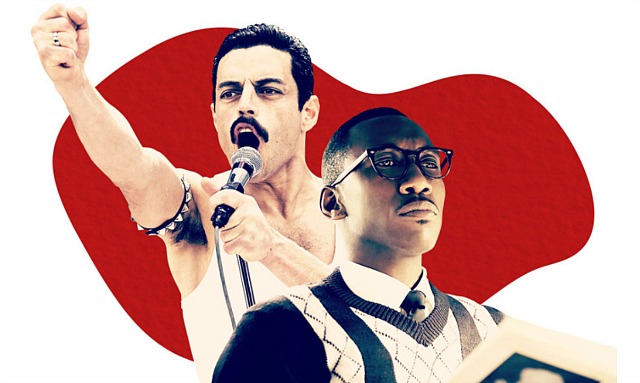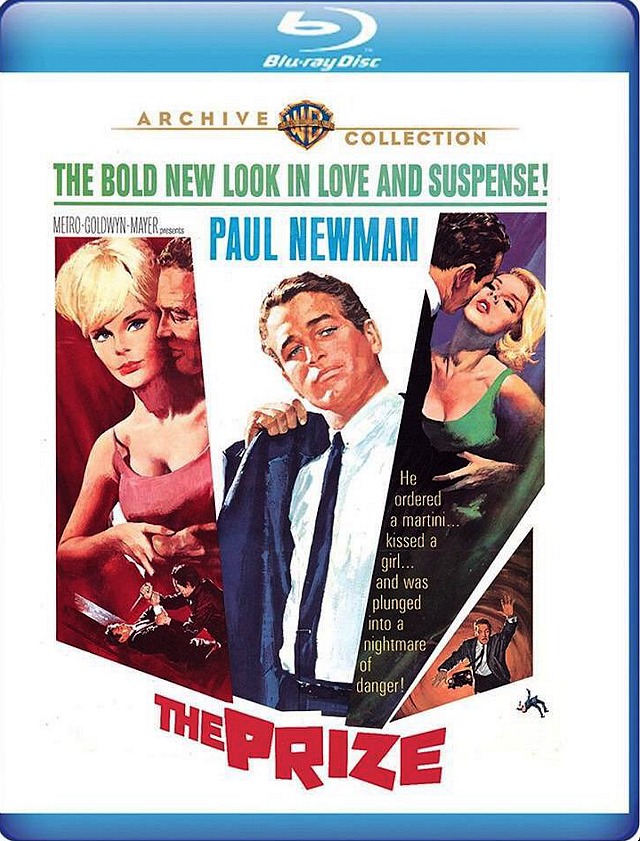Make of this what you will. Harmless. I blanked on Best Actor for some reason, and then it kicked out. I should have had a list in front of me. What is that awful tinny echo sound?
Day: January 16, 2019
Not Happening
Remember that totally moronic, p.c.-inflamed, tinted-blackface controversy that erupted for a day or two last August? The one involving Good Boys (Universal, 8.16), and which ignited after TMZ posted photos of a stand-in for 11-year-old Keith Williams wearing makeup to darken his skin color? Which resulted in producer Seth Rogen apologizing, etc.? And which Indiewire‘s Zack Sharf tried to further inflame by getting at least one cinematographer to say that the practice of applying blackface for lighting purposes was “unorthodox”?
Well, Good Boys is going to debut at South by Southwest 2019, and here’s an early still. One glance at this fucking shot of the three leads (Williams, Jacob Tremblay, Brady Noon) and I’m telling myself “no way….no way am I sitting through this.” I hate films about kids.

Reitman’s “Ghostbuster” Recreation
Why is Jason Reitman, the upscale, zeitgeist-assessing, Telluride- and Sundance-attuned director of The Front Runner, Up In The Air, Tully, Young Adult, Thank You For Smoking and Juno…why has Reitman decided to abandon his Renaissance Man, X-factor, thoughtful-cool-cat profile by directing a Ghostbusters movie, of all things?
[Click through to full story on HE-plus]
Good Advertising
Running With Beto, a doc about Beto O’Rourke‘s unsuccessful but profile-enhancing race against Ted Cruz for a U.S. Senate seat, will debut at the 2019 South by Southwest festival (3.8 — 3.17). Director David Modigliani (Crawford) had exclusive close-up access with O’Rourke from start to finish. Obviously the doc, which will almost certainly be programmed at other festivals before going to streaming, will serve as a reputation burnisher for O’Rourke’s 2020 presidential campaign. (The El Paso-based politician will probably launch his candidacy within the next two or three months.) I’m not saying O’Rourke will definitely attend the SXSW screening, but it’ll look pretty weird if he doesn’t.
Why “Roma” is A Slam Dunker
Green Book and Bohemian Rhapsody are no longer just Best Picture contenders with soiled reputations and checkered histories. They are now, in the view of Vulture‘s Nate Jones, “Oscar villains.” Villains, mind you. Which means…what, up to no good, bad karma, twirly moustache movies who tie fair young maidens to the train tracks, and sure to be foiled by the hero?
What exactly is a movie villain as defined by the last eight or nine years? It’s a film that “usually debuts at one of the fall festivals, where it earns rave reviews from the mostly white commentariat,” Jones explains. “It gets good buzz throughout the fall, and debuts to largely positive reception, but also some side-eyes on social media over its racial or sexual politics.
“These rumblings are often crystallized in a widely shared piece of criticism, after which viewers are forced to divide themselves into three camps: those who take pride in dunking on the film, those who defend it from the legions of haters, and those in the middle who consider it, at best, a problematic fave.
“Awards prognosticators write stories about how this negative buzz is not having an impact on voters, a point seemingly proven when the movie performs well at the Golden Globes. The Globes success in turn ramps up the backlash, but the film seems to be skating toward Oscar success until — sometimes at the last possible moment — it loses Best Picture to a less-controversial competitor.”
That “less controversial competitor,” trust me, is Roma. Alfonso Cuaron‘s memory film has no marks against it, and serves as a stirring metaphor for Trump pushback against the wall and general yokel-hinterland racism. Plus the Golden Globe and Critics Choice wins have already supplied a strong headwind.

Poor Mark Robson
What sane person in the year 2019 would want to watch The Prize, a piece of slick, cheesy, pseudo-swanky escapism with a James Bond-ian flourish?
Paul Newman starred as an alcoholic Nobel Prize winner in Stockholm, sipping a string of martinis as he puts the moves on Elke Sommer, and as they both get caught up in a Foreign Correspondent-type kidnapping caper. Empty, synthetic crap from start to finish.
And what about director Mark Robson? Talk about a tragic fall from grace.
A fledgling director-editor who was mentored in the 1940s by Val Lewton and Robert Wise, Robson hit his stride in 1949 when he directed the rough and gritty Champion and Home of the Brave, for producer Stanley Kramer.
Robson probably peaked with his direction of The Bridges of Toko-Ri (’54), a highly respected Korean War film with William Holden, as well as The Harder They Fall, a Budd Schulberg prize-fighter drama with Humphrey Bogart.
Robson then fell into a kind of soap-opera groove with Peyton Place (’57), The Inn of the Sixth Happiness (’58) and From The Terrace (’60). Then came the mildly approvable, moderately mediocre Lisa and Nine Hours To Rama (’63).
Later that year Robson fell off a cliff with The Prize. Then came the no-great-shakes Von Ryan’s Express (’65), a WWII actioner with Frank Sinatra.
In ’67 Robson was back in the soap opera ditch with Valley of the Dolls…good God. After that he made nothing but shit, shit, shit — Daddy’s Gone A-Hunting (’69), Happy Birthday, Wanda June (’71), Limbo (’72), Earthquake (’74). The poor guy died of a heart attack in ’78 at age 64.
Hoe do you go from Champion and The Bridges at Toko-Ri to Valley of the the Dolls and Daddy’s Gone A-Hunting…that’s what I want to know.

“Nice Daydream. Then What?”
The above headline is from a significant 1940s film. Ahh, what the hell.

Let Me Get This Straight
There are concerns among Puerto Rican artists and activists about Steven Spielberg and Tony Kushner‘s forthcoming remake of West Side Story. Chief among these is that the 1950s period musical (a) might not feel culturally authentic enough in its portrayal of Puerto Rican immigrants in Eisenhower-era Manhattan and (b) that it might present an offensively negative portrait of Puerto Rico.
The beloved Stephen Sondheim-Arthur Laurents-Leonard Bernstein musical conveys negative views of Puerto Rico in “America”, an ensemble tune that is chiefly sung by Bernardo’s sexy g.f. Anita (respectively played by Chita Rivera and Rita Moreno in the 1957 stage and 1961 film version). The sassy lyrics weigh the pros and cons of life in New York City vs. San Juan.
But in all fairness one also has to apply basic logic in this matter. Why did Puerto Ricans immigrate to America if things weren’t a tiny bit problematic in their native country in the first place? Spielberg’s film can present a culturally sensitive, politically correct view of Puerto Rico, fine — but why resuscitate West Side Story at all if you’re worried about dated views and impressions that are built into the narrative? Why re-tell a story of racial prejudice that is grounded in the fact that Puerto Ricans left their native land, presumably for pressing reasons?
Answer: Spielberg, the 800-pound gorilla in the room, wants to remake West Side Story because he wants to remake West Side Story. Because he was stirred in his mid teens by the Robert Wise-directed Oscar winner. Because he wants to stretch himself creatively, having never directed a musical. And because he feels he can update the show in a way that will not only revitalize the material but feel “correct” to the cultural commissars.
The Hollywood Reporter‘s Seth Abramovitch reported yesterday that these issues were discussed in a secret mid-December meeting on the San Juan campus of the University of Puerto Rico.
The small gathering was mostly composed of university students and faculty, but a San Juan film critic, Mario Alegre, also attended.
“Why West Side Story? And why now?” Alegre says to Abramovitch. “That was my first reaction. It’s a very sensitive film for Puerto Ricans because of their portrayal in it. It’s like doing Breakfast at Tiffany’s.”

